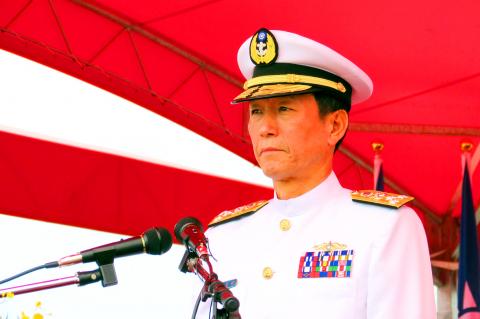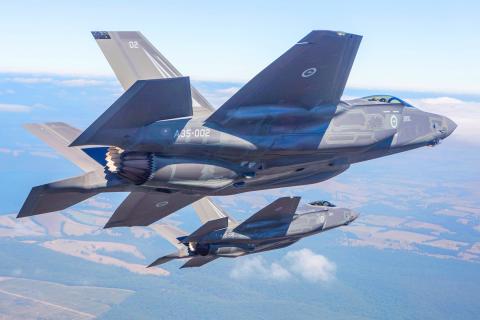The Ministry of National Defense yesterday confirmed President Tsai Ing-wen’s (蔡英文) appointment of Deputy Minister of National Defense Lee Hsi-ming (李喜明) as the nation’s new chief of the general staff, among a reshuffle of positions at the top of the military and the ministry.
Lee is to fill the position left vacant by Chief of the General Staff Chiu Kuo-cheng (邱國正), who assumed the post in December last year, but will reach the retirement age of 64 for the position by the end of this month.
Chiu turned down an invitation to extend his term, saying that the system of elevation of rank should be respected and that he would be retiring at the end of this month, sources who requested anonymity said.

Photo: CNA
Lee’s ministry post is to be filled by another admiral, Deputy Chief of the General Staff Pu Tze-chun (蒲澤春), while Deputy Commander of the Army Lieutenant General Chen Pao-yu (陳寶餘) is to take over from Pu and be promoted to general.
Deputy Minister of National Defense General Cheng Te-mei (鄭德美) is to transfer to the Presidential Office to act as Tsai’s strategic adviser, the ministry said in a statement, adding that Chungshan Institute of Science and Technology president Chang Guan-chung (張冠群) would fill Cheng’s position and would be promoted to general.
Chang’s promotion would be the first time an academic has taken a post as deputy minister of national defense, the sources said.

Photo: AFP
The reassignments are set to take effect on May 1.
Meanwhile, Minister of National Defense Feng Shih-kuan (馮世寬) yesterday told a meeting of the legislature’s Foreign Affairs and Defense Committee that the ministry would formally declare its intention to procure Lockheed Martin F-35 jets to US officials in July when Washington is expected to finalize its appointment of Taiwan affairs officials.
Asked by Democratic Progressive Party Legislator Lo Chih-cheng (羅致政) if the ministry would be seeking F-35s, Feng said that the ministry “has such a plan in response to the enemy’s military development.”
“Because the appointments of [US] officials have not yet been completed, [a formal proposal] would be made to Washington in July,” he said.
The military wants F-35s because their short takeoff and vertical landing capabilities, as well as their advanced stealth features, would allow the air force to retain combat capacity should its air bases be destroyed.
The attempt to acquire F-35s became the main topic of yesterday’s legislative session after the ministry announced that it would test the nation’s defensive capabilities with F-35s factored in during the computer simulation in this year’s Han Kuang exercises.
The simulation would be based on the cross-strait military balance in 2025, when Chinese People’s Liberation Army is expected to have three aircraft carriers and a fleet of Sukhoi Su-35 jets, Lieutenant General Chiang Chen-chung (姜振中) said.

CHAOS: Iranians took to the streets playing celebratory music after reports of Khamenei’s death on Saturday, while mourners also gathered in Tehran yesterday Iranian Supreme Leader Ayatollah Ali Khamenei was killed in a major attack on Iran launched by Israel and the US, throwing the future of the Islamic republic into doubt and raising the risk of regional instability. Iranian state television and the state-run IRNA news agency announced the 86-year-old’s death early yesterday. US President Donald Trump said it gave Iranians their “greatest chance” to “take back” their country. The announcements came after a joint US and Israeli aerial bombardment that targeted Iranian military and governmental sites. Trump said the “heavy and pinpoint bombing” would continue through the week or as long

TRUST: The KMT said it respected the US’ timing and considerations, and hoped it would continue to honor its commitments to helping Taiwan bolster its defenses and deterrence US President Donald Trump is delaying a multibillion-dollar arms sale to Taiwan to ensure his visit to Beijing is successful, a New York Times report said. The weapons sales package has stalled in the US Department of State, the report said, citing US officials it did not identify. The White House has told agencies not to push forward ahead of Trump’s meeting with Chinese President Xi Jinping (習近平), it said. The two last month held a phone call to discuss trade and geopolitical flashpoints ahead of the summit. Xi raised the Taiwan issue and urged the US to handle arms sales to

BIG SPENDERS: Foreign investors bought the most Taiwan equities since 2005, signaling confidence that an AI boom would continue to benefit chipmakers Taiwan Semiconductor Manufacturing Co’s (TSMC, 台積電) market capitalization swelled to US$2 trillion for the first time following a 4.25 percent rally in its American depositary receipts (ADR) overnight, putting the world’s biggest contract chipmaker sixth on the list of the world’s biggest companies by market capitalization, just behind Amazon.com Inc. The site CompaniesMarketcap.com ranked TSMC ahead of Saudi Aramco and Meta Platforms Inc. The Taiwanese company’s ADRs on Tuesday surged to US$385.75 on the New York Stock Exchange, as strong demand for artificial intelligence (AI) applications led to chip supply constraints and boost revenue growth to record-breaking levels. Each TSMC ADR represents

State-run CPC Corp, Taiwan (CPC, 台灣中油) yesterday said that it had confirmed on Saturday night with its liquefied natural gas (LNG) and crude oil suppliers that shipments are proceeding as scheduled and that domestic supplies remain unaffected. The CPC yesterday announced the gasoline and diesel prices will rise by NT$0.2 and NT$0.4 per liter, respectively, starting Monday, citing Middle East tensions and blizzards in the eastern United States. CPC also iterated it has been reducing the proportion of crude oil imports from the Middle East and diversifying its supply sources in the past few years in response to geopolitical risks, expanding